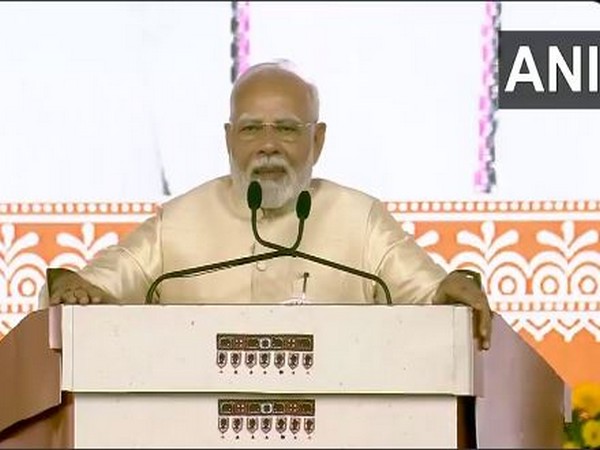PM Modi Unveils Rs 4,900 Crore Development Projects in Gujarat, Emphasizes Water Conservation, Connectivity, and Industrial Growth
The Prime Minister underscored the strategic importance of water management for Gujarat, a state long impacted by water scarcity.

- Country:
- India
Prime Minister Narendra Modi inaugurated and laid the foundation stone for a series of major development projects in Gujarat today, totalling over Rs 4,900 crore. These projects span multiple sectors including rail, road, water development, and tourism, and are designed to bring widespread benefits to the people of Amreli, Jamnagar, Morbi, Devbhoomi Dwarka, Junagadh, Porbandar, Kachchh, and Botad districts. Gujarat’s transformation in water security, infrastructure, and industrial expansion was the main focus of the Prime Minister's address, where he emphasized the region's future prosperity and resilience.
Strengthening Water Security for Gujarat
The Prime Minister underscored the strategic importance of water management for Gujarat, a state long impacted by water scarcity. He highlighted transformative initiatives like the Sauni Yojana and Jalsanchay programs, which have played a significant role in stabilizing water availability in Saurashtra and Kutch. Modi acknowledged the success of projects such as the Navda-Chavand Bulk Pipeline, which will soon deliver 30 crore liters of water daily to nearly 1,300 villages and over 35 cities, benefitting Amreli, Botad, Junagadh, Rajkot, and Porbandar. These water projects, he said, are crucial in addressing drinking water shortages, supporting agriculture, and promoting three-season farming.
Modi also laid the foundation for the second phase of the Pasvi Group Saurashtra Regional Water Supply Scheme, set to impact 100 villages across Talaja, Mahuva, and Palitana talukas, with a goal of providing consistent water access to all residents. The Prime Minister also highlighted the creation of 60,000 Amrit Sarovars across villages in India, part of a legacy for future generations. "Catch the Rain," a public water conservation campaign led by Minister C R Patil, is gaining momentum nationwide, empowering local communities to construct recharge wells, ensuring sustainable water retention in villages and fields.
Agricultural Boost with Modern Infrastructure and ConservationThe Prime Minister pointed to Gujarat’s achievements in agriculture, crediting the improved water situation for transforming farming practices in the state. Amreli, once hampered by water scarcity, now leads in three-season farming, producing high-value crops such as cotton, groundnut, sesame, and the famous Kesar mango. With a Geographical Indication (GI) tag, Kesar mango has brought global recognition to Amreli, providing new income streams for local farmers. Modi also noted that the district’s dairy industry has surged, now collecting around 1.25 lakh liters of milk daily, thanks to the establishment of Amar Dairy in 2007 and the growth of cooperative societies supporting nearly 700 villages.
The Prime Minister praised Amreli's success in honey production under India’s Sweet Revolution, as hundreds of farmers have embraced beekeeping as a secondary income source. Additionally, Modi introduced the PM Surya Garh Yojana, aimed at saving households Rs 25,000 to Rs 30,000 annually on electricity bills through rooftop solar panel installations. In Amreli, the village of Dudhala is on its way to becoming the district's first solar village, cutting monthly power expenses by Rs 75,000.
Connectivity: Driving Industrial and Tourism GrowthGujarat’s expanding connectivity infrastructure was also a focal point in Modi’s address. Projects like the ro-ro ferry service between Saurashtra and Surat have simplified travel for over 7 lakh people, transporting more than 1 lakh cars and 75,000 trucks since its inception. Similarly, the Jamnagar-Amritsar-Bhatinda Economic Corridor will facilitate the movement of goods from Gujarat to Punjab, accelerating regional economic growth.
Railway and road upgrades are underway to improve access to industrial hubs like Jamnagar and Morbi, easing the journey to popular tourist destinations like Somnath and Dwarka. Modi pointed to plans for expanded rail connections in Kutch, supporting both tourism and the area’s growing industries.
Boosting the Tourism Economy: New Prospects in Saurashtra
The Prime Minister also touched on Saurashtra’s role in Indian tourism, noting the popular appeal of Sardar Sarovar Dam and the Statue of Unity, which attracted over 50 lakh visitors last year. Modi highlighted ongoing development at the Kerly Bird Sanctuary, which is set to become an eco-tourism hub with adventure sports offerings. Additionally, the National Maritime Heritage Complex in Lothal will celebrate India’s maritime history, showcasing artifacts from India’s ancient ports and promoting cultural tourism along Gujarat's coastline.
International Engagement and Economic PartnershipsIn his concluding remarks, Prime Minister Modi spoke on India’s expanding role on the world stage, referencing recent international partnerships including agreements with Germany and Spain. The German Chancellor’s recent visit saw India’s annual visa quota to Germany increased to 90,000, offering greater opportunities for Indian youth. Meanwhile, Spain’s investment in Vadodara for manufacturing transport aircraft will create jobs in Gujarat’s emerging aviation sector, potentially benefiting thousands of small and micro industries across the state.
Modi reflected on his tenure as Gujarat’s Chief Minister, noting that Gujarat’s growth has driven national progress. “A Viksit Gujarat will strengthen the path to a Viksit Bharat,” he affirmed. Joined by dignitaries such as Gujarat’s Governor Shri Acharya Devvrat, Chief Minister Bhupendra Patel, and Union Minister of Jal Shakti Shri C R Patil, Prime Minister Modi commended the people of Gujarat and the leaders who have contributed to the state’s inspiring transformation. 4o









